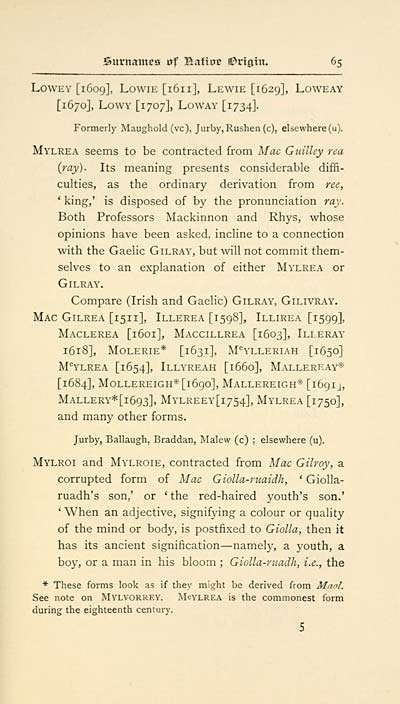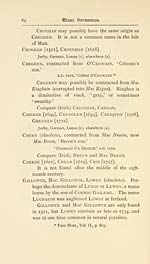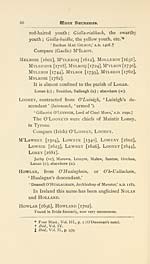Download files
Complete book:
Individual page:
Thumbnail gallery: Grid view | List view

Surnames tyf Bafttrc i!?ri0tn. 65
LowEv [i6og], LowiE [1611], Lewie [1629], Loweay
[1670], LowY [1707], LowAY [1734].
Formerlj' Maughold (vc), Jurby, Rushen (c), elsewhere (u).
Mylrea seems to be contracted from Mac Guilley yea
{ray). Its meaning presents considerable diffi-
culties, as the ordinary derivation from ree,
* king,' is disposed of by the pronunciation ray.
Both Professors Mackinnon and Rhys, whose
opinions have been asked, incline to a connection
with the Gaelic Gilray, but will not commit them-
selves to an explanation of either Mylrea or
Gilray.
Compare (Irish and Gaelic) Gilray, Gilivray.
Mac Gilrea [1511], Illerea [1598], Illirea [1599],
Maclerea [1601], Maccillrea [1603], Illeray
1618], Molerie* [1631], M'^ylleriah [1650]
M°ylrea [1654], Illyreah [1660], Mallereay*
[1684], Mollereigh*[i69o], Mallereigh* [1691J,
Mallery*[i693], Mylreey[i754], Mylrea [1750],
and many other forms.
Jurby, Ballaugh, Braddan, Malew (c) ; elsewhere (u).
Mylroi and Mylroie, contracted from Mac Gilroy, a
corrupted form of Mac Giolla-ruaidh, ' Giolla-
ruadh's son,' or ' the red-haired youth's son.'
' When an adjective, signifying a colour or quality
of the mind or body, is postfixed to Giolla, then it
has its ancient signification — namely, a youth, a
boy, or a man in his bloom ; Giolla-ruadli, i.e., the
* These forms look as if they might be derived from Maol.
See note on Mylvorrey. Mcylrea is the commonest form
during the eighteenth century.
5
LowEv [i6og], LowiE [1611], Lewie [1629], Loweay
[1670], LowY [1707], LowAY [1734].
Formerlj' Maughold (vc), Jurby, Rushen (c), elsewhere (u).
Mylrea seems to be contracted from Mac Guilley yea
{ray). Its meaning presents considerable diffi-
culties, as the ordinary derivation from ree,
* king,' is disposed of by the pronunciation ray.
Both Professors Mackinnon and Rhys, whose
opinions have been asked, incline to a connection
with the Gaelic Gilray, but will not commit them-
selves to an explanation of either Mylrea or
Gilray.
Compare (Irish and Gaelic) Gilray, Gilivray.
Mac Gilrea [1511], Illerea [1598], Illirea [1599],
Maclerea [1601], Maccillrea [1603], Illeray
1618], Molerie* [1631], M'^ylleriah [1650]
M°ylrea [1654], Illyreah [1660], Mallereay*
[1684], Mollereigh*[i69o], Mallereigh* [1691J,
Mallery*[i693], Mylreey[i754], Mylrea [1750],
and many other forms.
Jurby, Ballaugh, Braddan, Malew (c) ; elsewhere (u).
Mylroi and Mylroie, contracted from Mac Gilroy, a
corrupted form of Mac Giolla-ruaidh, ' Giolla-
ruadh's son,' or ' the red-haired youth's son.'
' When an adjective, signifying a colour or quality
of the mind or body, is postfixed to Giolla, then it
has its ancient signification — namely, a youth, a
boy, or a man in his bloom ; Giolla-ruadli, i.e., the
* These forms look as if they might be derived from Maol.
See note on Mylvorrey. Mcylrea is the commonest form
during the eighteenth century.
5
Set display mode to: Large image | Transcription
Images and transcriptions on this page, including medium image downloads, may be used under the Creative Commons Attribution 4.0 International Licence unless otherwise stated. ![]()
| Early Gaelic Book Collections > Blair Collection > Surnames & place-names of the Isle of Man > (83) |
|---|
| Permanent URL | https://digital.nls.uk/82100644 |
|---|
| Description | A selection of books from a collection of more than 500 titles, mostly on religious and literary topics. Also includes some material dealing with other Celtic languages and societies. Collection created towards the end of the 19th century by Lady Evelyn Stewart Murray. |
|---|
| Description | Selected items from five 'Special and Named Printed Collections'. Includes books in Gaelic and other Celtic languages, works about the Gaels, their languages, literature, culture and history. |
|---|

